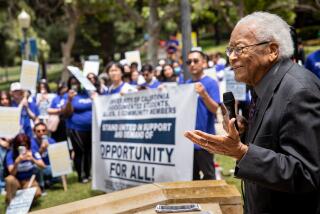Philippines Taught Us Lessons of Nonviolence
- Share via
The dramatic collapse of Ferdinand E. Marcos’ regime in the face of an enormous nonviolent insurrection has important lessons. It is becoming clear that these lessons are rapidly being learned by the people of South Korea and are likely to influence political events elsewhere in the coming months. The events in the Philippines showed that dictators need not be accepted passively, and that effective alternatives to violent revolts exist. The principle is to withdraw the sources of power.
The Roman Catholic Church spoke out against Marcos and counseled nonviolent resistance. Opposition politicians planned a campaign of economic and political resistance. The general population mounted huge demonstrations to show that it would not submit to election fraud and murder. Soldiers mutinied, and officials and diplomats defected. Thousands of people turned back tanks ordered to attack nonviolent rebel troops at Camp Crame.
When it was clear that the end of Marcos’ regime was in sight, the United States withdrew its support and pressured him to leave. Once the actual resistance was under way, the struggle succeeded quickly and casualties were relatively few.
The Filipino people’s brave example to the world may well stimulate new nonviolent freedom struggles elsewhere. Which country will be next to follow their example--Indonesia, South Korea, Chile?
The Philippines’ was not the first successful nonviolent overthrow of a repressive regime. The rule of Czar Nicholas II of Russia collapsed after about a week of the mainly nonviolent February-March Revolution of 1917. The regimes of Gen. Hernandez Martinez in El Salvador and Gen. Jorge Ubico of Guatemala were dissolved by nonviolent insurrections of about two weeks each in 1944. And, recently, Jean-Claude Duvalier was forced to flee due to widespread popular defiance in Haiti only weeks before Marcos’ ouster.
A vast but neglected history exists of nonviolent defiance of foreign conquerors, domestic tyrants and oppressive systems. Internationally, nonviolent sanctions have included non-cooperation, economic embargoes, diplomatic boycotts and nonviolent invasions; domestically, they have included civilian insurrections, civil-disobedience campaigns, labor strikes, economic boycotts, civil-liberties struggles and minority rights’ movements.
Nonviolent action includes at least 198 distinct methods ranging from mild symbolic protests to potentially paralyzing forms of social, economic and political non-cooperation, and to the disruptive forms of intervention. Nonviolent resisters have been defeated, achieved mixed results and been victorious in the face of enormous odds--as in the Philippines.
We often forget that nonviolent struggle was sometimes used successfully even against the Nazis. In Norway the teachers’ resistance kept the schools out of fascist control and prevented the establishment of a totalitarian state. Non-cooperation and underground escape networks saved many Jews’ lives. A more-than-week-long public demonstration by 6,000 women, most of them non-Jewish, in Berlin in 1943 resulted in the release of at least 1,500 Jews.
Each successive case of nonviolent anti-communist struggle in Eastern Europe since 1953 has been more difficult for the Soviets to crush. Resistance in East Germany in June, 1953, was crushed in two days. The improvised Czech-Slovak resistance in 1968-69 ultimately failed, but it held off Soviet control for eight months, which would have been impossible by military means. In Poland, resistance continues after five years with major achievements, including a large illegal information system that publishes papers, magazines and books.
Nonviolent sanctions operate on an important insight into the nature of political power: The power of all rulers and governments is vulnerable, impermanent and dependent on sources in society.
A ruler’s power depends on the degree of cooperation, submission, obedience and assistance received from the subjects--both the general population and paid helpers. Nonviolent non-cooperation and disobedience cut off the sources of the ruler’s power. If the defiance continues despite repression, it will disintegrate even a dictatorship.
Contrary to the usual assumption, dictatorships are not omnipotent. They contain weaknesses; nonviolent sanctions exploit them. Given that these nonviolent sanctions exist, the question becomes to what degree they can be applied and to what degree they will be effective.
In the past, most nonviolent struggles have been improvised, without large-scale preparation or training. Thus they may be simply prototypes of what could be developed by deliberate efforts. It seems certain that a combination of scholarship and preparation could make future nonviolent struggles much more effective. It is possible that this technique could become a full substitute for violence in liberation struggles and even for national defense.
More to Read
Sign up for Essential California
The most important California stories and recommendations in your inbox every morning.
You may occasionally receive promotional content from the Los Angeles Times.










